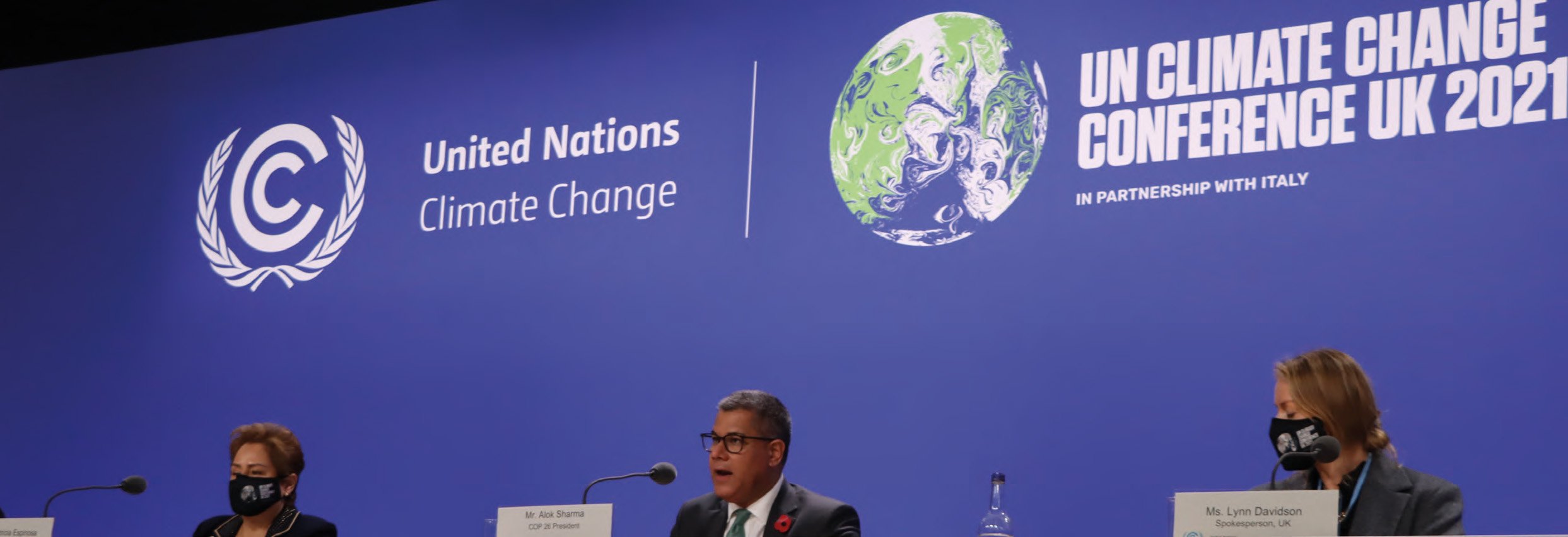At the end of November, a joint LR and Maritime London webinar assessed the impact of COP26 outcomes, evaluated if the industry’s ambitions and objectives were achieved and analysed next steps. Click here to watch the webinar.
The world’s attention was drawn to the city of Glasgow in November as the UK hosted Global Climate Change Summit COP26 – formally the 26th meeting of signatory nations (literally the ‘Conference of Parties’) to the UN Framework Convention on Climate Change first agreed back in 1992.
Top-line commitments agreed during the two-week event included promises by more than 40 countries to phase ‘down’ – not ‘out’ as initially proposed, while another 100-plus nations (including Brazil) pledged to end and reverse deforestation by 2050. China and the US came up with a surprise agreement to work together this decade to limit global temperature rise; various nations vowed to cut back methane emissions by 2030; and more countries joined the list of those targeting carbon neutrality by 2050, as well as India by 2070.
In terms of shipping, the timing of COP26 just a couple of weeks before an important session of the IMO’s Marine Environment Protection Committee (MEPC 77) to discuss cutting shipping’s GHG Greenhouse Gas (GHG) emissions, meant there was an outpouring of ‘calls to action’ and pledges from various organisations and coalitions both before and in the sidelines surrounding, COP. These essentially called for the IMO to demonstrate its commitment to the urgency of climate change by replacing its current target of halving shipping’s GHG emissions by 2050 (versus 2008 levels) with the goal of net-zero by the same date.
Later nations attending MEPC 77 chose to defer any such decision to the formal Review process for IMO’s GHG Strategy to be completed by 2023 – at the same time failing to discuss the shipping industry’s parallel proposal for the immediate creation of a $5bn R&D fund into decarbonisation, to be funded by a market-based measure such as a carbon levy on marine fuel. While these decisions came as a disappointment to many, this was in part due to the very upscaling of ambition that COP26 had engendered.
And Glasgow did indeed provide some tangible outcome for shipping in the form of The Clydebank Declaration, whereby some 20 countries agreed to work together on establishing ‘green shipping corridors’ – demonstration projects routes on which to pilot the use of zero-emission vessels – by 2025.
Introducing an industry conference held in Glasgow on the eve of the transport discussions at COP, moderator Nusrat Ghani MP, former UK Minister for Maritime, explained the historical significance of the Clydebank region by pointing out that 100 years ago it had been producing one in five of the world’s ships. And speaking at the same event, LR CEO Nick Brown identified an agreement in principle on the creation of green corridors as being the single most important outcome for shipping that he was looking for from the main summit.
Other shipping- and maritime-related agreements reached at COP included creation of a Just Transition Maritime Task Force comprising several international shipping and labour organisations to drive the decarbonisation of shipping and within it an equitable transition for seafarers.
And in a little-reported development four Latin American countries – Colombia, Costa Rica, Ecuador and Panama – agreed to join their marine reserves to form one interconnected area covering more than 500,000 square km that will serve as one of the world’s richest pockets of ocean biodiversity and a fishing-free corridor. This will not only protect one of the world’s most important migratory routes for many species of fish and sea mammals but also prevent the fishing practice of ocean floor dragging during trawling operations, which releases important amounts of carbon dioxide emissions by destroying the seabed’s ‘carbon sink’ effect.
Tallying up the COP26 scorecard immediately afterwards, Philip Roche, co-head of law firm Norton Rose Fulbright’s global shipping practice, commented: "Although shipping, like aviation, lay outside the formal conference agenda, the number of side events and the number of attendees from the IMO, EU and key stakeholders showed that the shipping community was determined to demonstrate that meaningful steps are being taken to allow shipping to play its part in global decarbonisation, however difficult and indistinct that path may be."
"There is real effort being made into working out how this journey may be travelled," Roche added, "whether that will be through improving the efficiency of the existing fleet through regulation, or by the production and supply of new fuels, or by measures such as the Clydebank Declaration for green shipping corridors, or finally, the use of financial measures and instruments such as market-based measures and/or a carbon levy on fuel. In the end, it will probably be a combination of these measures which allow global shipping to achieve the goals set by both the IMO, the EU and other parties, including users of shipping."
"Within shipping it’s no longer about the discussion of 50% [carbon reduction] by 2050 compared to 2008 levels and challenging whether this is going to be possible or not, this has now shifted to zero [carbon] by 2050,"
Speaking at a subsequent webinar co-organised by LR and Maritime London entitled ‘COP26: first assessments on the outcomes for shipping’, LR Decarbonisation Programme Manager Charles Haskell said he thought there had definitely been an "increase in ambition" from both governments and non-governmental bodies, and that it was important that the shipping industry is seen as not being left behind.
"Within shipping it’s no longer about the discussion of 50% [carbon reduction] by 2050 compared to 2008 levels and challenging whether this is going to be possible or not, this has now shifted to zero [carbon] by 2050," he said, as evidenced by the pledges made by various industry organisations or shipping-related groupings – such as the Getting to Zero Coalition, Cargo Owners for Zero Emission Vessels (coZEV), Poseidon Principles and newly launched First Movers Coalition (FMC) – with some even going further and "moving the needle to the left" by targeting 2040.
Questioned how he thought The Clydebank Declaration on green corridors would play out in practice, Haskell said he thought "the devil will be in the detail and that needs to be ironed out. The first part is to get the agreements of governments that are willing to back it and that will pull in the investment and de-risk those aspects. And that’s not just a case for shipping," he added, "but for ports it will be an infrastructure challenge as much as anything."
What the agreement will really do is "enable full-scale pilot projects of end-to- 9end transportation to grow," he continued. In this way the lessons learned can be shared and will cascade down onto other routes, he said – including considerations of resources as well as ports and shipping – and it’s important that this begins soon, as shipping really has only 30 years to manage the energy transition and "hopefully The Clydebank Declaration can be a catalyst to get that going."
Haskell later added that although the technology for reducing carbon emissions may be available in time, the fuels likely will not. He cited the example of the Castor Initiative, where LR is teamed with six other companies to design and build an ammonia-fuelled aframax tanker that is scheduled to be in the water by 2024.
"It’s all very well to have goals and ambitions," said Haskell in a sentiment that could apply equally well to COP26 itself, "but the regulatory push isn’t there". He believes that the ‘key imperative’ at present is for the shipping industry to "refine its energy efficiency", because while there are plenty of technologies out there to do so at the moment, the uptake rate is low.
Haskell’s views on the importance of energy efficiency suggest that the IMO’s impending Energy Efficiency of Existing Ships Index (EEXI) and Carbon Intensity Indicator (CII) measures will at least mark one welcome regulatory step in the right direction, one might say, even if MEPC 77 failed to deliver on much of COP26’s ambition.
The LR Decarbonisation Programme Manager remained confident overall on the outcomes of the Glasgow climate change conference.
"There have been some very good ambitions coming out of this which will move forward beyond COP," Haskell said. "All round it’s been very proactive for shipping. I would only expect this to grow in further COPs, and maybe have dedicated time for shipping alone."











